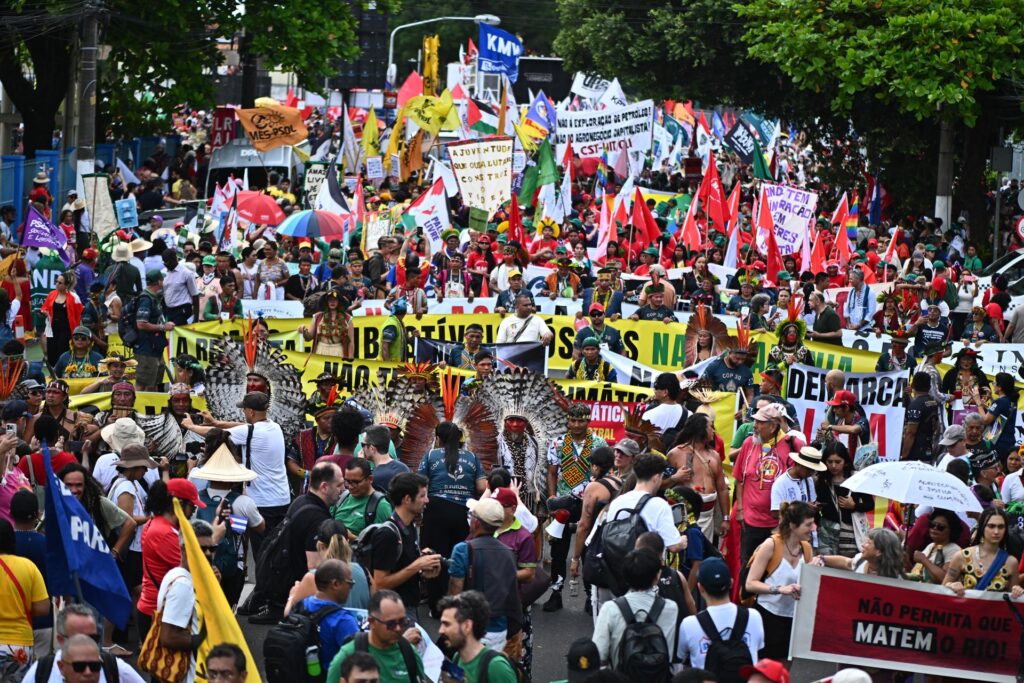More than 70,000 people took to the streets of Belém (Brazil) this Saturday for the Global Climate March, the central event of the People’s Summit, an autonomous initiative organized by more than 1,100 social movements that opposes the closed negotiations of COP30.
Under the slogan “We are the answer,” Indigenous peoples, farmers, Afro-descendants, workers, and youth marched 4.5 kilometers to the Cabana Village, a symbolic space of resistance in the Amazon, in homage to the Cabanagem Uprising and the day of the Proclamation of the Republic.
The demonstration was a collective cry against the capitalist production system that destroys trees, rivers, and ecosystems. Banners with slogans such as “Agribusiness is fire,” “There is no climate justice without a people’s agrarian reform,” and “Environmental collapse is capitalist” resonated amidst drums, traditional songs, and ancestral dances.
“Workers from all over the world marched here to affirm that the true republic we believe in is one that guarantees workers’ rights, that cares for nature with future generations in mind, and that knows how to defend our country’s sovereignty,” said Ayala Ferreira, of the Landless Workers Movement (MST) and the political commission of the People’s Summit.
The Indigenous voice was central. Dyneva Kayabi, from the Coordination of Indigenous Organizations of the Brazilian Amazon (COIAB), demanded: “Without demarcation, there is no life, no education, no health. The answer is in our hands, because without us we have no clean air, no standing forests, no living rivers, and we do not have Mother Earth fully preserved.”
The Waorani leader Timoteo Huamoni, from Ecuador, reminded everyone: “Our ancestors have shed their blood. So we must raise our voices throughout the world.”
The Munduruku people, who blocked the main entrance to COP30 last Friday, once again shouted “present.” Estefani Mañhuary denounced: “The presence of Indigenous people at COP30 is very weak. They weren’t allowed in, so we had to make ourselves heard through protests.” Meanwhile, many media outlets launched attacks to discredit those who, through their resistance and work, sustain the Amazon rainforest.
Benedito Huni Kuin, 50, from western Brazil, stated with sorrow: “Today we are witnessing a massacre, as our forest is being destroyed. We want our voices to be heard from the Amazon and demand results. We need more Indigenous representatives at COP25 to defend our rights.”
The mobilization also demanded a new mining model based on popular sovereignty. Elane Barros, from the Movement of People Affected by Mining, declared: “All the peoples of the world have gathered here to announce that climate justice will only be possible if it includes and places people at the forefront. We need sovereignty over mining, food, and all related decisions.”
More than 70,000 people took to the streets of Belém in the Global Climate March.
More than 70,000 people took to the streets of Belém in the Global Climate March, an independent initiative organized by more than 1,100 social movements in opposition to the closed negotiations of COP30. Photo: EFE.
Low expectations for change prevail among Indigenous movements
Participants in the mobilization say that expectations for real change at COP30 are minimal. While world leaders negotiate behind closed doors, disillusionment is taking hold among civil society actors, especially Indigenous peoples.
“There was an expectation, at the narrative level, that this COP had to be wonderful, and, spoiler alert, it’s going very badly. My general feeling is that this COP has been sold as if it were going to cover and solve a lot of things, and the actual action that will result from the words is very little,” said Javier Andaluz, Climate and Energy Coordinator at Ecologists in Action.
The lack of commitment from Europe and the United States to emissions reduction plans and climate finance is one of the biggest obstacles. “The European Union seems unwilling to open this debate. It considers that it closed it last year in Baku,” Andaluz denounced. “Since the beginning of the negotiations in 1992, the countries of the Global North have already committed to this necessary funding. The EU’s latest decisions go against fulfilling this historical responsibility. They demonstrate not only an inability to provide funds, but also an inability to commit to real reductions in greenhouse gases.”
Thousands of young people participated in this powerful march that took to the streets of Belém to condemn the governments that produce the most greenhouse gas emissions, but whose corrupt and conservative politicians do nothing to promote genuine climate action to save the planet. Photo: @LemusteleSUR.
For her part, Ugandan activist Hilda Nakabuye, founder of Fridays for Future in her country, was one of the few who maintained a note of hope: “Let’s hope that Belém rises to the occasion, that it delivers clear demands for Indigenous peoples, for the communities affected by climate change.” Although she acknowledged that “I take it as a hopeful sign” that the COP accepted the power of the streets, her tone revealed skepticism: “We have seen too many broken promises.”
The Global Climate March was not a spectacle, but a statement: climate justice is not negotiated in halls, it is built from the ground up, with the people, against extractive capitalism. And as the planet heads towards a warming of 2.3 to 2.5 °C by 2100, the voices of Belém cry out: without sovereignty, without land, without life, there is no climate justice.
IMAGE CREDIT: The Global Climate March was not a spectacle, but a statement: climate justice is not negotiated in halls, it is built from the ground up, with the people, against extractive capitalism. Photo: @LemusteleSUR.
[ SOURCE: teleSUR ]

